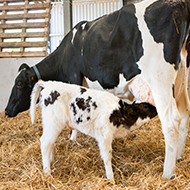Simple cleaning changes could improve dairy calf health - study

The study suggests cleaning colostrum collection equipment after every use with hot water.
Making simple changes to cleaning practices could significantly minimise the risk of disease in calves on dairy farms, according to new research.
The study, published in the journal Frontiers in Veterinary Medicine, is among the first in the UK to explore colostrum hygiene on British dairy farms.
Dr Robert Hyde, one of the researchers on the study, said: “This study provides a first look at bacteria levels in Great Britain, and the results suggest there are a few simple changes to collection and cleaning protocols that could have a significant impact on colostrum hygiene levels on British dairy farms.
“By making these simple changes there is likely to be significant improvement in colostrum hygiene, which is essential in minimising the risk of disease and ensuring the optimum health and welfare of calves on dairy farms.”
Among the key recommendations include:
- cleaning colostrum collection and feeding equipment after every use with hot water as opposed to cold water
- using hypochlorite or peracetic acid as opposed to water or parlour wash
- preparing cows' teats with a pre-milking teat disinfectant and wipe with a clean, dry paper towel prior to colostrum collection
- pasteurising colostrum where possible.
Because calves are born without any immunity, they are heavily reliant on colostrum to protect them against disease. It is vital that calves receive an adequate quantity of good quality colostrum as soon as possible after birth.
In the study, experts from the School of Veterinary Medicine and Sciences at the University of Nottingham analysed data from 328 colostrum samples from 56 British dairy farms.
Researchers found that the samples collected from collection and feeding equipment had higher levels of bacteria than those collected directly from the cows’ teat. This indicates that while colostrum from the cow is relatively low in bacterial levels, improperly cleaned equipment can be a major source of bacterial contamination.
The team also noted that more than one-third of samples collected from collection or feeding equipment was over the threshold for high bacterial levels and represent a significant risk to the health of calves.
Dr Hyde adds: “By analysing colostrum collection protocols on the farms, we were able to identify a small number of management practices likely to have a substantial impact on colostrum hygiene for the majority of farms. For example, the use of scalding hot water to clean collection and feeding equipment could reduce bacteria levels by over 90 per cent compared with using cold water only.
“Less than half of farms used scalding hot water to clean colostrum collection and feeding equipment, suggesting there are a large number of farms that could make this simple change.”



 The RCVS has announced a new version of its 1CPD mobile app, with enhanced features for veterinary surgeons and veterinary nurses to record their continuing professional development.
The RCVS has announced a new version of its 1CPD mobile app, with enhanced features for veterinary surgeons and veterinary nurses to record their continuing professional development.